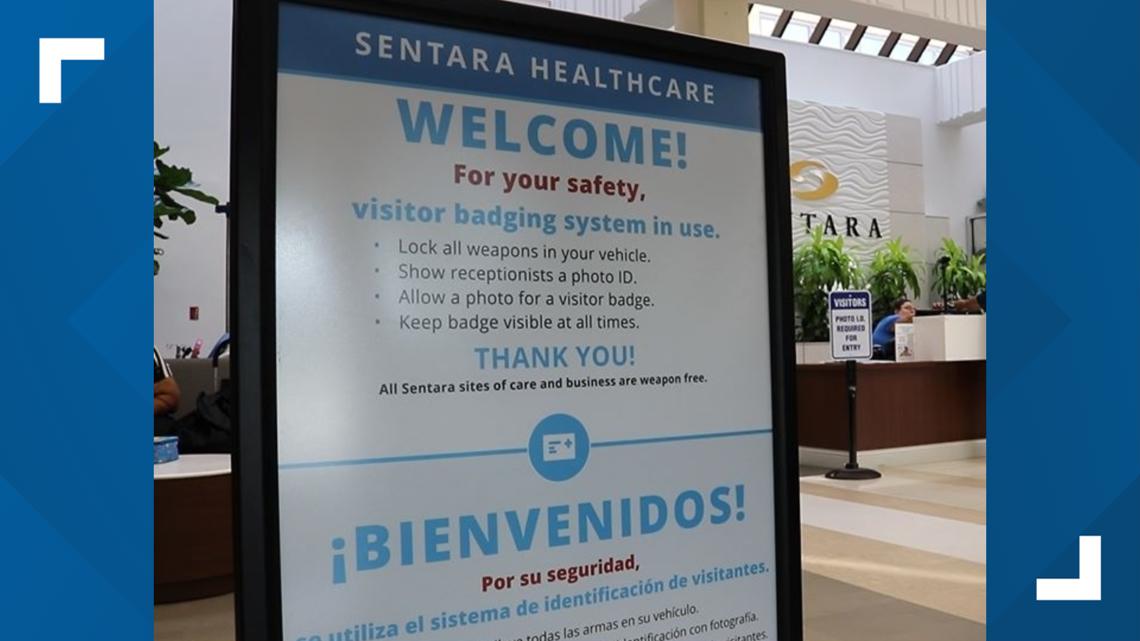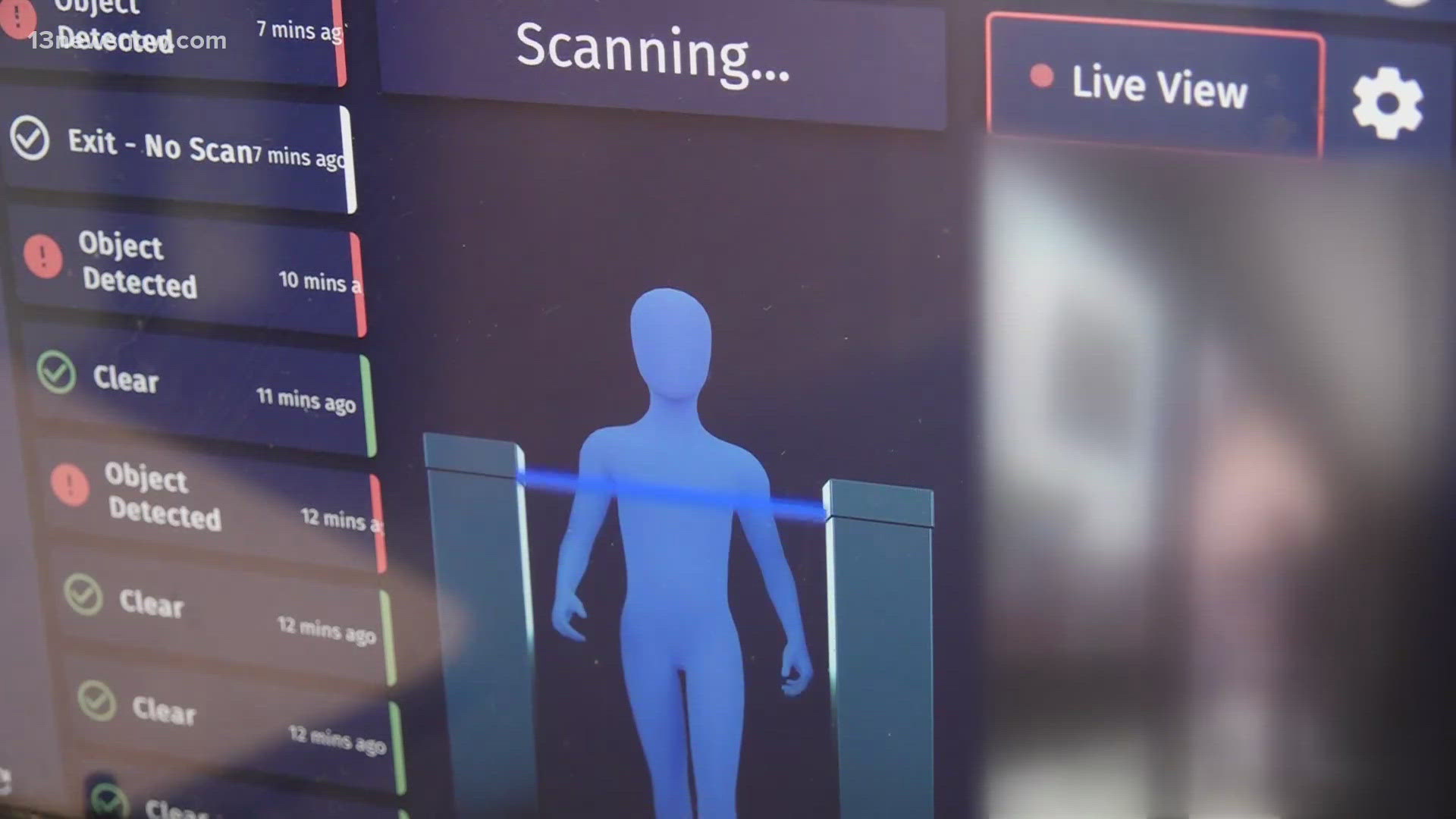NORFOLK, Va. — What do machetes, handguns, and crossbows have in common?
People in Hampton Roads have tried to bring all of them into hospital emergency departments in recent years.
In most cases, people plead ignorance or forgetfulness. But others have more sinister motivations.
What are hospitals and lawmakers doing to keep weapons out of hospitals?
New AI-powered weapon detectors
Doctors and nurses suit up knowing the risk they face for just doing their jobs. Healthcare workers are five times more likely to be injured at work than people in other professions.
The disparity is forcing healthcare leaders to take a critical review of their own security. Leaders at Sentara Health credit a few recent safety changes with a reduction in workplace violence.
In October 2022, Sentara installed new concealed weapons detectors at the entrances to the emergency departments at Sentara Norfolk General Hospital and Sentara Virginia Beach General Hospital. The devices use artificial intelligence to recognize the consistency and shape of a weapon.
Stephen Hollowell oversees security at all Sentara Hospitals.
“Unfortunately, firearms within hospitals are more and more prevalent, shootings within hospitals,” Hollowell said.
Since their installation 20 months ago, the new weapons detectors have intercepted 2,484 weapons that would have otherwise entered the emergency departments, including:
- 1,204 knives
- 158 box cutters
- 84 tasers
- 64 handguns
- 2 machetes
“[We've prevented] a multitude of martial arts weapons, believe it or not, axe, crossbow, so it kind of runs the gamut,” Hollowell said.
Youngkin vetoed 'Weapons in Hospitals' bill
At Sentara Health, the goal of the weapons detectors is prevention, not prosecution. After all, there’s no law in Virginia specifically regarding weapons in hospitals.
Delegate Phil Hernandez of Norfolk wants to change that.
“Hospitals should be sanctuaries where you’re not at risk of any harm," Hernandez said.
During this year's legislative session, he introduced House Bill 861, which would make it a Class 1 misdemeanor to bring a weapon into a hospital.
“We have laws that applies to schools and courtrooms and other sensitive areas, but nothing that applies directly to hospitals,” said Hernandez.
The bill, known as the “Protecting Frontline Healthcare Workers Act” passed mostly along party lines in the Virginia House and Senate, with just one House Republican voting in favor of the legislation.
The bill made it to the governor's desk, where it came to a dead end in May. Governor Glenn Youngkin vetoed the legislation on May 17, saying “the proposal is unnecessary and has unintended consequences for hospital employees and patients.”
Tragedy strikes Riverside Regional Medical Center
On May 26, a little more than a week after the governor’s veto, an armed woman in her late 70s went to the fourth floor of Riverside Regional Medical Center (RRMC) in Newport News, where she shot and killed her husband and then herself.
The governor’s communications team did not comment when we asked about that incident, and instead referred 13News Now to his statement at the time of the veto.
“It seems like a lot of times we wait until tragedies happen and then we’re like, ‘Oh well, we should focus on this problem,’” Hernandez said. “This bill was an attempt to get out ahead, and to make sure we don’t have situations like what happened at Riverside, or frankly any future ones that God forbid they happen in the future as well.”
It’s not the first "situation" at Riverside Regional Medical Center. Weeks after a patient stabbed a nurse in the emergency department in 2021, the hospital installed metal detectors in the ED. Those metal detectors intercepted more than 2,000 knives and 60 firearms from entering the facility last year.
The woman from May’s shooting was able to bypass the ED metal detectors by using a different entrance to enter Select Specialty Hospital.
That incident has Dr. Mike Dacey, the President and CEO of Riverside Health, taking a closer look at their security.
“More must be done to protect our team members, patients, and visitors,” Dacey said in a statement to 13News Now.
Dacey is now evaluating whether to invest in new weapons detection systems, like those using AI.
“We’ve been hosting team member town halls at RRMC and with their valuable input, we will be making immediate updates to our safety and security measures including increasing security staff levels and hiring a Workplace Violence Coordinator to supplement our security education, training and communications efforts,” Dacey said.
Leaders at Riverside Health will spend the coming weeks considering additional security staffing, access control protocols, and technology across all locations.
Hospitals take matters into their own hands
Hospitals can already ban guns. The failed House Bill 861 would have made it a crime to bring one inside a hospital.
A spokesperson with Bon Secours Mercy Health said its leaders were in support of the bill, and reiterated the heightened risk healthcare workers faced in recent years.
“We have worked with our colleagues at other Virginia health systems to clarify and strengthen laws concerning violence and threats against health care workers. We will continue to support legislation that would prohibit weapons, of all kinds, in hospitals,” said Emma Swann, Director of Public Relations & Communications at Bon Secours Mercy Health.
Delegate Hernandez said he will attempt to pass that legislation again next year, even if that means tweaking it to get the support it needs.
Meanwhile, hospital systems are taking matters into their own hands.


Sentara Health will spend the next few months installing the concealed weapons detectors in all 12 of its hospitals. The cost ranges from $40,000-120,000 per system.
Sentara Health also added a new badging protocol for visitors and installed a tele-magistrate system that allows healthcare workers to connect virtually with the local magistrate to press charges then and there.
Dozens of Sentara security officers are also currently undergoing training with the Virginia Dept. of Criminal Justice Services (DCJS) to carry a gun as they man the new weapons detectors.
“I think we have put a good system in place. Does it mean we need to relax? No, it means we need to continue completely re-upping our game,” Hollowell said.

